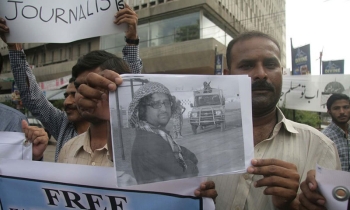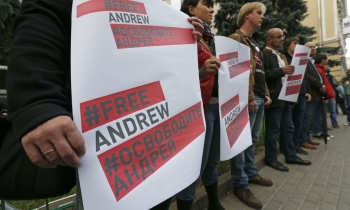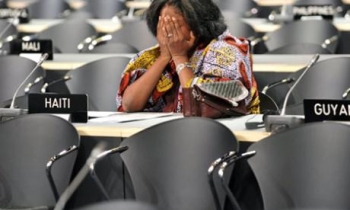Journalists from Ukraine and Gambia have been honoured with the International Press Freedom Award for persisting in their work even while facing serious threats to their lives. Mykola Veresen of Ukraine and Alagi Yorro Jallow of Gambia were selected from an exceptional group of nominees, the largest list of submissions Canadian Journalists for Free Expression (CJFE) has considered in recent years.
Mykola Veresen is a veteran journalist and respected television broadcaster in the Ukraine. He was known as one of the founders of Charter 4, a Kiev-based non-profit group with the goal of engaging the media in monitoring and managing projects that support a civil society in Ukraine. He was the anchor at Channel 5 during the Orange Revolution and became, for many, the voice and face of the Revolution. He was nominated by a private citizen.
Alagi Yorro Jallow, managing editor of The Independent in Gambia, was chosen for his uncompromising and fearless efforts to promote press freedom in Gambia, despite numerous obstacles. CJFE's selection committee was overwhelmed by his ceaseless commitment to uphold and promote press freedom in the Gambia. Jallow was nominated by World Association of Newspapers (WAN).
CJFE promotes and defends free expression and press freedom and grants thousands of dollars to aid persecuted journalists in Latin America, Africa, Asia and Eastern Europe. The annual award is given to journalists outside of Canada by the CJFE to recognise and call attention to the many countries where journalists face personal danger simply for telling the truth.
CJFE's 8th Annual International Press Freedom Awards were given away in Toronto on November 1, 2005. The guest speaker on the occasion was Seymour Hersh, controversial investigative journalist who broke the My Lai massacre story in Vietnam, and more recently captured the spotlight with his stories on the Abu Ghraib scandal in Iraq.
The selection committee � senior journalists Carol Off, Joe Schlesinger, Paul Knox and Sally Armstrong � received nominations from Syria, Colombia, DRC, Sierra Leone, Zimbabwe, Spain and Uzbekistan in addition to the two nominees.
"The selection committee was impressed by all the submissions," said Rod Macdonell, CJFE's executive director. "In the end, Mykola Veresen's and Alagi Yorro Jallow's cases exemplified true fighters for freedom of the press. Their courageous work in the face of great adversity has demonstrated an exceptional commitment to free expression."
Mykola Veresen

In November 2004, the Orange Revolution began in Ukraine as a series of political protests and events in response to charges of election fraud in the November 21 run-off election. Playing a crucial role in the revolution was independent TV channel 5, a small cable station which was the sole media outlet to give unbiased coverage to the challenger, Viktor Yushchenko. The station was closely watched by international monitors as a key indicator of the fairness of the elections. Mykola Veresen was the anchor and became, for many, the voice and face of the Orange Revolution.
Veresen was at this time a veteran and respected journalist. He was also the first Ukrainian journalist to work for a foreign news service, the BBC reporting for them from 1986-1996. He then became a star as host of the social affairs programme called "Taboo" which tackled themes that had previously been taboo such as drug problems, sex, and police corruption. Veresen is also known as one of the founders of Charter 4, a Kyiv-based non-profit group with the goal of engaging the media in monitoring and managing projects that support a civil society in Ukraine.
The Orange Revolution was successful and for the most part peaceful, but it is very possible that if it had not been Veresen's career could have ended, and he would have faced possible persecution or imprisonment. The Ukraine has been a dangerous country in which be a journalist in recent years. In 2004, 20 journalists were arrested and more than 30 were physically attacked. In the past ten years, four journalists have been murdered in the Ukraine.
Alagi Yorro Jallow

As the environment for press freedom in the Gambia has deteriorated over the past few years, Alagi Yorro Jallow has been a passionate advocate for the human rights. He has worked as a journalist at several news outlets in Gambia since 1987, most recently as the managing editor of The Independent. He has also worked as a correspondent for the BBC and the International Press Institute and a consultant to the London-based free expression organisation Article 19.
For four years, he served as the vice-chairman of the Gambia Press Union where he was part of a successful campaign to disband a government controlled media commission with extensive powers to punish journalists. He is also working to end the impunity enjoyed by the murderers of fellow journalist Deyda Hydara, whose killing in December 2004 was thought to be politically motivated. Though he is temporarily in the US, he has continued his advocacy work by speaking at universities and conferences on the worsening environment for freedom of expression in his homeland.
His work as a journalist and human rights advocate has not been without opposition. In April 2004, a group of armed men entered the office of The Independent in the early morning and set it ablaze with the staff still inside. Several staff were wounded and the office and printing equipment owned by the paper was destroyed causing huge financial losses. Other acts of intimidation have included death threats, detentions and physical assaults against him and his staff. The Committee to Protect Journalists (CPJ) recently noted the decline in press freedom in Gambia 2004 "a year marked by arson attacks, threats, and repressive legislation aimed at the independent media."









